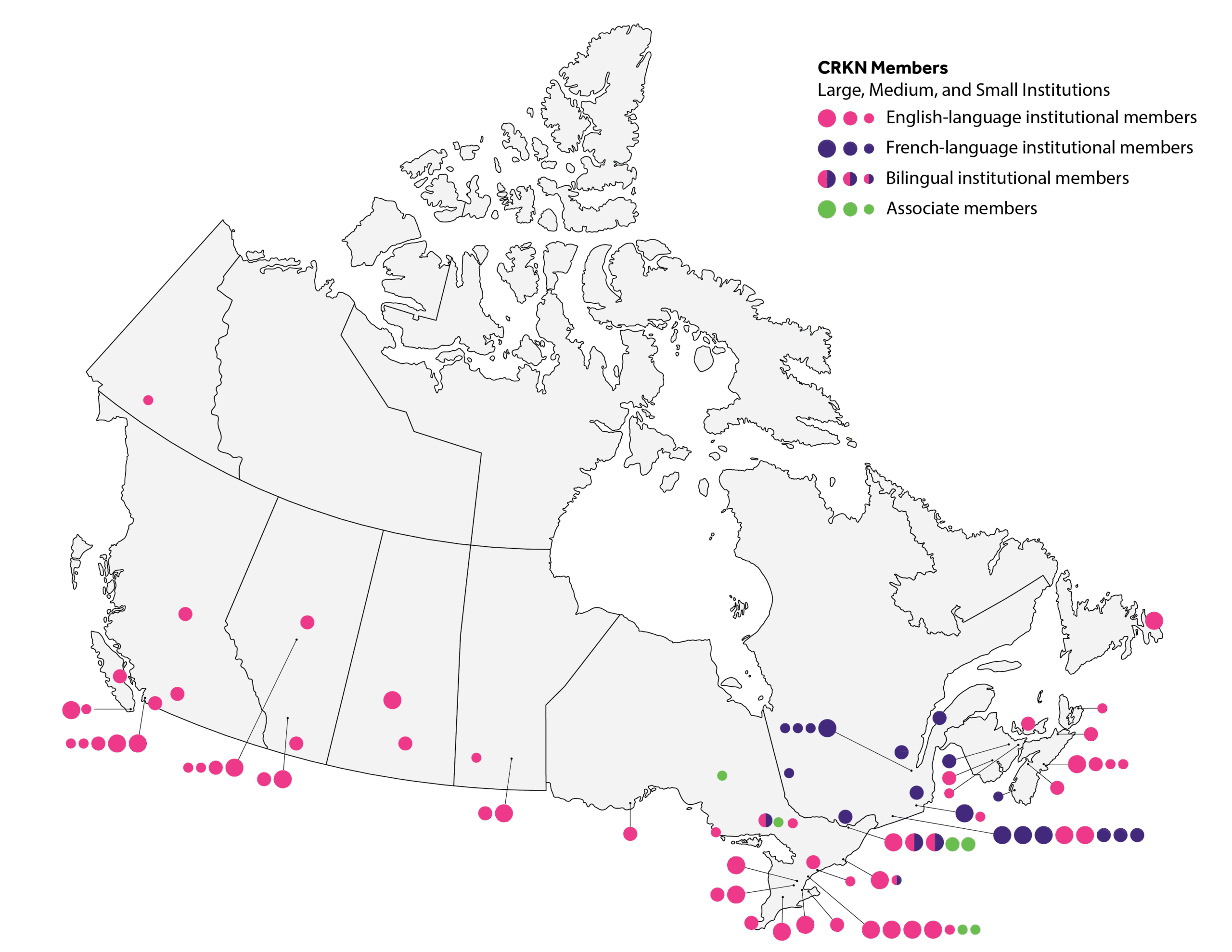Charting the path to open knowledge in Canada
Celebrating a quarter century of connecting research communities across Canada.
Annual Report 2024–2025
For our member organizations and the diverse communities they serve, CRKN empowers researchers, educators, and society with greater access to the world’s research and Canada’s preserved documentary heritage, now and for future generations.

Vision
Knowledge is accessible to all.
Mission
Together, we empower Canada by creating pathways to trusted knowledge.
A message from the Executive Director
What an exciting and transformative year it has been at CRKN! The progress we achieved in the past year would not have been possible without the insight and dedication of our Board, committees, task groups, and staff. I am pleased to share the highlights and achievements that have defined this important year.
CRKN celebrated its 25th anniversary in 2024 and launched a new five-year strategic plan for 2025-2029. Developed through extensive consultation with members, the plan reaffirms our mission to empower Canada by creating pathways to trusted knowledge. It sets a clear direction for the future and strengthens our commitment to drive the evolution of open knowledge, share our collective value, and innovate and collaborate for a sustainable future.
CRKN’s Licensing Team, supported by the Content Strategy Committee, completed key license renewals and expanded open access publishing opportunities. A new three-year read and publish agreement with the Royal Society of Chemistry will make over 500 Canadian-authored articles openly available each year. We also renewed major agreements with the American Chemical Society, Cambridge University Press, Clarivate, Wiley, and others, ensuring continued access to high-quality content.
2024 also marked the 10th anniversary of the Partnership for Open Access, our long-standing collaboration with Érudit. We celebrated 10 years of the partnership and worked together on a new 5-year partnership agreement for 2025-2029 that substantially increases the financial investment from our member libraries in order to truly sustain the journals supported by this vital open infrastructure. With support from 54 Canadian university libraries, the partnership now supports over 240 non-commercial journals. Together, we have enabled 34 journals to transition to open access, reduced embargo periods, and ensured that over 2,000 articles are shared each year without article processing charges.
With support from the Preservation and Access Committee and the Canadiana Content Sub-Committee, the Heritage Services and Infrastructure and Development teams made significant strides to modernize the Canadiana platform and diversify the collections. We held our first call for digitization projects, selecting six collections from member institutions to add into Canadiana. In partnership with the University of Ottawa and with support from our members, we submitted our Canada Foundation for Innovation (CFI) application to transform Canadiana into cutting-edge open research infrastructure. While we await funding decisions, the team continues to build for the future in alignment with our development roadmap, which includes new tools for collection management, persistent identifier integration, improved interoperability, an accessible image viewer, and a redesigned user interface.
Our persistent identifier program continues to be a cornerstone of CRKN’s work to support a connected and open research ecosystem. With renewed funding from the Digital Research Alliance of Canada, we advanced the national PID strategy efforts through the work of ORCID-CA and DataCite Canada. We welcomed new members to the communities and were particularly pleased to see Canadian funders, the Natural Sciences and Engineering Research Council and Social Sciences and Humanities Research Council, join ORCID-CA. As we built and strengthened the PID community in Canada, we saw steady growth in PID adoption and integration across the research community.
Throughout 2024-2025, we prioritized member engagement through targeted webinars, individual meetings with member institutions, and events such as the 2024 Member Summit and AGM. These conversations with our members, alongside a member survey in early 2025, are shaping our strategic initiatives and ensuring that our work continues to reflect member needs and priorities, especially in navigating budget pressures and supporting the transition to open access. Our members are at the heart of everything that we do at CRKN and I was so pleased to get to speak with so many of our directors this year to better understand how CRKN can support your needs as we work collectively to drive the evolution of open knowledge.
I would like to thank CRKN’s Board of Directors and committees for their vision and steadfast support, our dedicated staff for their commitment and expertise, and our members for their ongoing trust and collaboration. Your support enables CRKN to continue to grow, evolve, and deliver meaningful progress for Canada’s digital research and knowledge infrastructure.
Clare Appavoo
Executive Director

A message from the Executive Director
What an exciting and transformative year it has been at CRKN! The progress we achieved in the past year would not have been possible without the insight and dedication of our Board, committees, task groups, and staff. I am pleased to share the highlights and achievements that have defined this important year.
CRKN celebrated its 25th anniversary in 2024 and launched a new five-year strategic plan for 2025-2029. Developed through extensive consultation with members, the plan reaffirms our mission to empower Canada by creating pathways to trusted knowledge. It sets a clear direction for the future and strengthens our commitment to drive the evolution of open knowledge, share our collective value, and innovate and collaborate for a sustainable future.
CRKN’s Licensing Team, supported by the Content Strategy Committee, completed key license renewals and expanded open access publishing opportunities. A new three-year read and publish agreement with the Royal Society of Chemistry will make over 500 Canadian-authored articles openly available each year. We also renewed major agreements with the American Chemical Society, Cambridge University Press, Clarivate, Wiley, and others, ensuring continued access to high-quality content.
2024 also marked the 10th anniversary of the Partnership for Open Access, our long-standing collaboration with Érudit. We celebrated 10 years of the partnership and worked together on a new 5-year partnership agreement for 2025–2029 that substantially increases the financial investment from our member libraries in order to truly sustain the journals supported by this vital open infrastructure. With support from 54 Canadian university libraries, the partnership now supports over 240 non-commercial journals. Together, we have enabled 34 journals to transition to open access, reduced embargo periods, and ensured that over 2,000 articles are shared each year without article processing charges.
With support from the Preservation and Access Committee and the Canadiana Content Sub-Committee, the Heritage Services and Infrastructure and Development teams made significant strides to modernize the Canadiana platform and diversify the collections. We held our first call for digitization projects, selecting six collections from member institutions to add into Canadiana. In partnership with the University of Ottawa and with support from our members, we submitted our Canada Foundation for Innovation (CFI) application to transform Canadiana into cutting-edge open research infrastructure. While we await funding decisions, the team continues to build for the future in alignment with our development roadmap, which includes new tools for collection management, persistent identifier integration, improved interoperability, an accessible image viewer, and a redesigned user interface.
Our persistent identifier program continues to be a cornerstone of CRKN’s work to support a connected and open research ecosystem. With renewed funding from the Digital Research Alliance of Canada, we advanced the national PID strategy efforts through the work of ORCID-CA and DataCite Canada. We welcomed new members to the communities and were particularly pleased to see Canadian funders, the Natural Sciences and Engineering Research Council and Social Sciences and Humanities Research Council, join ORCID-CA. As we built and strengthened the PID community in Canada, we saw steady growth in PID adoption and integration across the research community.
Throughout 2024–2025, we prioritized member engagement through targeted webinars, individual meetings with member institutions, and events such as the 2024 Member Summit and AGM. These conversations with our members, alongside a member survey in early 2025, are shaping our strategic initiatives and ensuring that our work continues to reflect member needs and priorities, especially in navigating budget pressures and supporting the transition to open access. Our members are at the heart of everything that we do at CRKN and I was so pleased to get to speak with so many of our directors this year to better understand how CRKN can support your needs as we work collectively to drive the evolution of open knowledge.
I would like to thank CRKN’s Board of Directors and committees for their vision and steadfast support, our dedicated staff for their commitment and expertise, and our members for their ongoing trust and collaboration. Your support enables CRKN to continue to grow, evolve, and deliver meaningful progress for Canada’s digital research and knowledge infrastructure.

Clare Appavoo
Executive Director
A message from the Chair of the Board

This year marked the beginning of my term as Chair of the CRKN Board of Directors, and it is a privilege to take on this role as we celebrated 25 years of collective progress in expanding access to research and heritage content across Canada. As President of Dalhousie University, I have long believed in the vital role that libraries play in shaping the research and learning environment in Canada. Through CRKN, we see this role amplified: CRKN is bringing institutions together to create pathways to trusted knowledge and laying the foundation for a more equitable, sustainable, and connected future.
Over the past year, CRKN has demonstrated how strategic collaboration can address some of the most pressing challenges facing Canadian research institutions. As universities, libraries, and research institutions navigate tightening budgets and rising costs, CRKN continues to deliver tangible value through cost-effective licensing and open access agreements. At a time when support for research and access to knowledge are under increasing threat in other parts of the world—marked by funding cuts, growing politicization of science, and efforts to restrict educational content—Canada has a critical opportunity to distinguish itself as a global leader in research, knowledge sharing, and academic integrity. CRKN’s licensing and open access initiatives not only expand access to scholarly content, enabling innovative Canadian research, but also reinforce Canada’s leadership in open scholarship and deliver on the vital role that our institutions must play in empowering the Canadian public with access to expert knowledge.
CRKN’s commitment to preserving Canada’s digital heritage plays a foundational role in expanding access to trusted knowledge. As conversations about Canadian identity and our shared future continue to evolve, the Canadiana collections offer a critical resource for reflection, research, and reconciliation. The ongoing evolution of the Canadiana collections ensures that scholars and communities can engage with Canada’s past in ways that acknowledge and confront the legacies of colonialism. Through meaningful partnerships and dedicated stewardship, CRKN is committed to upholding principles of data sovereignty and honours the rights of communities to determine how heritage materials are described, shared, or withheld. As we engage with our history, I look forward to seeing the transformation of Canadiana into an open research infrastructure that can leverage new technological innovations to help researchers and all Canadians understand our past and support a more equitable future.
At the same time, CRKN’s leadership in the national persistent identifiers (PIDs) strategy is strengthening the infrastructure needed for a more reliable and interconnected research ecosystem—ensuring that knowledge is not only preserved, but discoverable, verifiable, and enduring.
Looking ahead, CRKN’s newly launched 2025–2029 Strategic Plan provides an ambitious and timely roadmap. In an era marked by artificial intelligence and rising misinformation, this plan centres on the values of connection, agility, and responsibility. These are the very principles I believe should guide all of us across the academic and research ecosystem. Over the next five years, CRKN will drive the evolution of open knowledge in Canada, amplify the collective value of our network and infrastructure, and foster innovation and collaboration for a sustainable future. With strong partnerships across our member institutions, this plan will propel CRKN forward in its mission to collectively empower Canada with access to trusted knowledge.
As CRKN celebrates its 25th anniversary, I am reminded of the power of this network, not just as an organization, but as a shared commitment to making knowledge more accessible and meaningful. I would like to extend my deepest thanks to CRKN’s members for their ongoing support and trust, to my fellow Board members for their thoughtful leadership, and to the CRKN staff and volunteers whose work continues to elevate the entire sector.
With confidence in our direction and pride in what we have achieved together, I look forward to what the next chapter holds for CRKN—and for the research communities we serve.
Kim Brooks
Chair, CRKN Board of Directors
President and Vice-Chancellor, Dalhousie University
A message from the Chair of the Board
This year marked the beginning of my term as Chair of the CRKN Board of Directors, and it is a privilege to take on this role as we celebrated 25 years of collective progress in expanding access to research and heritage content across Canada. As President of Dalhousie University, I have long believed in the vital role that libraries play in shaping the research and learning environment in Canada. Through CRKN, we see this role amplified: CRKN is bringing institutions together to create pathways to trusted knowledge and laying the foundation for a more equitable, sustainable, and connected future.
Over the past year, CRKN has demonstrated how strategic collaboration can address some of the most pressing challenges facing Canadian research institutions. As universities, libraries, and research institutions navigate tightening budgets and rising costs, CRKN continues to deliver tangible value through cost-effective licensing and open access agreements. At a time when support for research and access to knowledge are under increasing threat in other parts of the world—marked by funding cuts, growing politicization of science, and efforts to restrict educational content—Canada has a critical opportunity to distinguish itself as a global leader in research, knowledge sharing, and academic integrity. CRKN’s licensing and open access initiatives not only expand access to scholarly content, enabling innovative Canadian research, but also reinforce Canada’s leadership in open scholarship and deliver on the vital role that our institutions must play in empowering the Canadian public with access to expert knowledge.
CRKN’s commitment to preserving Canada’s digital heritage plays a foundational role in expanding access to trusted knowledge. As conversations about Canadian identity and our shared future continue to evolve, the Canadiana collections offer a critical resource for reflection, research, and reconciliation. The ongoing evolution of the Canadiana collections ensures that scholars and communities can engage with Canada’s past in ways that acknowledge and confront the legacies of colonialism. Through meaningful partnerships and dedicated stewardship, CRKN is committed to upholding principles of data sovereignty and honours the rights of communities to determine how heritage materials are described, shared, or withheld. As we engage with our history, I look forward to seeing the transformation of Canadiana into an open research infrastructure that can leverage new technological innovations to help researchers and all Canadians understand our past and support a more equitable future.
At the same time, CRKN’s leadership in the national persistent identifiers (PIDs) strategy is strengthening the infrastructure needed for a more reliable and interconnected research ecosystem—ensuring that knowledge is not only preserved, but discoverable, verifiable, and enduring.
Looking ahead, CRKN’s newly launched 2025–2029 Strategic Plan provides an ambitious and timely roadmap. In an era marked by artificial intelligence and rising misinformation, this plan centres on the values of connection, agility, and responsibility. These are the very principles I believe should guide all of us across the academic and research ecosystem. Over the next five years, CRKN will drive the evolution of open knowledge in Canada, amplify the collective value of our network and infrastructure, and foster innovation and collaboration for a sustainable future. With strong partnerships across our member institutions, this plan will propel CRKN forward in its mission to collectively empower Canada with access to trusted knowledge.
As CRKN celebrates its 25th anniversary, I am reminded of the power of this network, not just as an organization, but as a shared commitment to making knowledge more accessible and meaningful. I would like to extend my deepest thanks to CRKN’s members for their ongoing support and trust, to my fellow Board members for their thoughtful leadership, and to the CRKN staff and volunteers whose work continues to elevate the entire sector.
With confidence in our direction and pride in what we have achieved together, I look forward to what the next chapter holds for CRKN—and for the research communities we serve.

Kim Brooks
Chair, CRKN Board of Directors
President and Vice-Chancellor, Dalhousie University
Our Members
CRKN supports 88 member institutions—including universities, libraries, and research institutions—with a shared commitment to advancing research, preservation and access, and open knowledge across Canada.
Welcome to our newest members!
The National Research Council Canada and the Research and Development Institute for the Agri-Environment were both approved to join the CRKN membership as Associate Members, participating in the content licensing program, at the Annual General Meeting in October 2024. Library of Parliament joined the CRKN membership by approval of the Board of Directors in January 2025 as an Associate Member, participating in the heritage program. The addition of these new members brings the total number of CRKN members to 88.
CRKN Members
British Columbia
Alberta
Saskatchewan
Ontario
Nova Scotia
Prince Edward Island
Newfoundland
Yukon
See how CRKN spent this past year.

